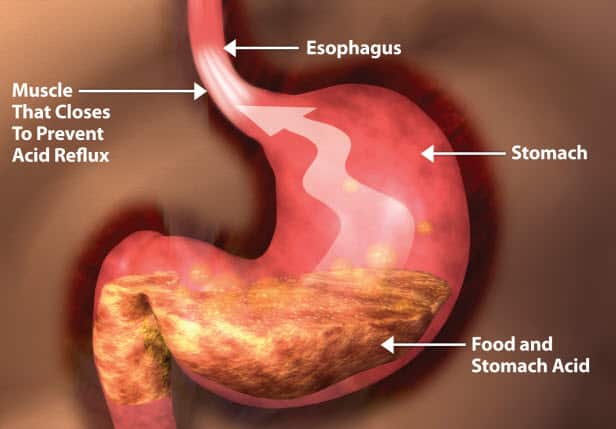What is GERD?
GERD (gastroesophageal reflux disease) is a chronic gastrointestinal condition in which acid produced by the stomach is refluxed back up into the esophagus. This backup of stomach acid causes irritation of the lining of the esophagus, which causes the unpleasant symptoms associated with GERD (see list below). If left untreated, GERD can occasionally lead to inflammation and damage to the esophagus referred to as esophagitis. Patients in the Plano, TX area with longstanding GERD symptoms should undergo an endoscopy to screen for Barrett’s esophagus (a change in the lining of the lower esophagus which increases the risk of esophageal cancer).

GERD Symptoms
The symptoms of GERD can very widely from patient to patient. The most common symptoms of GERD are:
- Belching
- Chest pain
- Dry cough
- Frequent throat clearing
- Heartburn
- Nausea
- Sensation of lump in throat
- Swallowing problems
- Throat irritation
If dietary changes and over the counter medications don’t alleviate your GERD symptoms after a few weeks, you should see your physician. I’ll describe diagnosis and treatment options for GERD in the next sections.
GERD Treatments Plano, TX
Lifestyle and diet modifications are the best initial step in improving heartburn related symptoms:
- Eat smaller more frequent meals (avoid overeating)
- Stop eating at least three hours prior to going to bed
- Elevate the head of their bed 4 to 6 inches
- Lose weight (if overweight)
- Stop smoking
- Avoid tomato based products, citrus products (i.e. orange juice, lemonade, limeade, etc), chocolate, fried fatty foods, carbonated beverages, alcohol, and coffee.
People who continue to experience infrequent symptoms can often take an over the counter H2 blocker like ranitidine or famotidine when the symptoms arise. Those suffering from more chronic reflux issues and symptoms more than 2 -3 times per week (that are not relieved with lifestyle modification) will likely benefit from Proton pump inhibitor therapy (ie. omeprazole, lansoprazole, esomeprazole, etc.). Anyone who has been on acid reducing medications for a prolonged period of time or who has persistent symptoms should be evaluated by a gastroenterologist to determine if further evaluation is necessary.
How does a Gastroenterologist evaluate persistent GERD symptoms?
The best way to evaluate the esophagus for any damage from reflux disease is to perform an EGD or upper endoscopy. By performing an endoscopy, your gastroenterologist in Plano TX can directly visualize the esophageal mucosa and take biopsies if necessary to determine if changes consistent with esophagitis or Barrett’s esophagus are present.
If the diagnosis remains in question, a Bravo capsule study can be performed. A Bravo capsule study is an esophageal pH study in which a small capsule device is attached to the lower esophagus and sends pH readings to a recorder worn on a belt. This study can determine the whether or not a patient is experiencing a significant amount of acid reflux during the recorded period.
If reflux is severe, some patients may require surgical intervention. Surgical options include a Nissen fundoplication or the Linx procedure.
